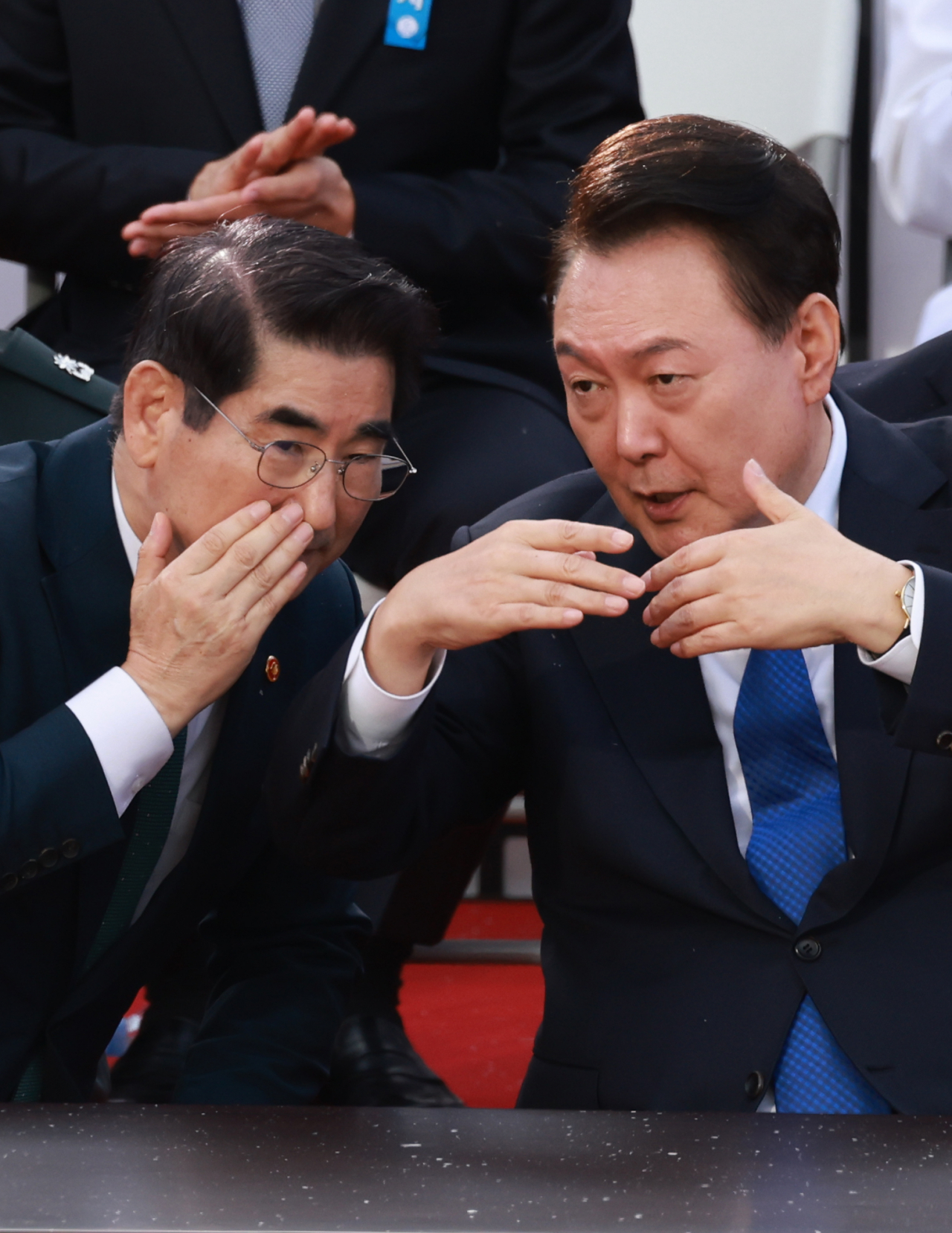 |
South Korean President Yun Suk Yeol (right) talks with former Defense Minister Kim Yong-hyun, as he watches a parade at Gwanghwamun Square in Seoul on Oct. 1, marking Armed Forces Day. (Presidential office/Newsis) |
South Korean prosecutors filed an arrest warrant for former Defense Minister Kim Yong-hyun, accusing him of collaborating with President Yoon Suk Yeol to orchestrate an insurrection in the controversial Dec. 3 martial law declaration. This marks a significant development in the investigation, as prosecutors identify Yoon as the central figure behind the alleged coup attempt.
Kim, summoned by the special prosecution investigation team for questioning on insurrection, abuse of power and other charges, decided to forgo a court hearing on Tuesday. He apologized to the public, stating, "I deeply regret having caused significant unrest and discomfort to the people. All responsibility for this incident rests solely with me."
The court had initially scheduled Kim’s predetention hearing for 3 p.m. Tuesday. However, with Kim’s decision to waive the hearing, the court will now decide whether to issue the writ for Kim based solely on documents submitted by prosecutors and his legal counsel. The ruling will mark the judiciary's first assessment of whether the martial law declaration constitutes insurrection.
Prosecutors said they are seeking the warrant over concerns that Kim, a key suspect who proposed martial law to Yoon, might attempt to flee or tamper with evidence, given that he changed mobile phones after the martial law announcement.
The Special Investigation Headquarters of the prosecution, led by Seoul High Prosecutor Park Se-hyun, charged Kim with participating in key tasks related to insurrection and abusing his authority to obstruct the exercise of government powers. Prosecutors allege that Kim advised Yoon to unlawfully declare martial law and that he directed military forces to intervene at the National Assembly and National Election Commission.
According to prosecutors, Kim worked alongside top military and law enforcement officials to orchestrate actions aimed at suppressing legislative authority. They claim these actions constitute an attempt to disrupt the constitutional order, a violation punishable under Article 87 of the Criminal Code.
Prosecutors, however, appear to have made it clear that Kim’s role was pivotal but secondary to Yoon, who is described as the mastermind behind the martial law decree. By targeting Kim, investigators are setting the stage to extend their inquiry to Yoon and other senior officials.
Under South Korean law, those involved in insurrection can be categorized as ringleaders, participants in planning or execution, or individuals who simply carried out orders. Prosecutors have reportedly classified Kim as someone who undertook significant tasks, stopping short of being the ringleader.
Prosecutors argue that the martial law declaration was aimed at overriding the constitutionally protected functions of the National Assembly. They point to the deployment of military forces to block access to the National Assembly and to prevent a vote to nullify martial law as evidence of an attempt to undermine constitutional governance.
Although martial law was revoked within six hours following a resolution by the National Assembly, prosecutors contend that the intent to disrupt constitutional order suffices to meet the legal definition of insurrection.
Kim’s long-standing relationship with Yoon, whom he knew from high school, adds another layer of intrigue to the case. Kim had offered his resignation on Dec. 4, the day martial law was revoked, and was promptly dismissed by the president. He later turned himself in for questioning in the early hours of Sunday, after initially refusing to respond to prosecution summons.
The court is expected to make its decision on Kim's arrest late Tuesday or early Wednesday.
However, questions surrounding the legitimacy and role of the prosecution in this case are intensifying. The investigation has become a battleground among South Korea’s prosecutorial, police and anti-corruption agencies, with critics raising concerns about jurisdictional overreach and conflicts of interest.
Cho Kuk, leader of the minor opposition Rebuilding Korea Party, has called for the prosecution to step back from the martial law investigation, citing their history of leniency in politically sensitive cases.
The prosecution has no jurisdiction over insurrection charges, and their track record, such as clearing first lady Kim Keon Hee in a luxury handbag scandal, undermines their credibility, he contended.
Cho further accused the prosecution of leveraging the investigation for political maneuvering. “The prosecution, which has long protected the Yoon-Kim administration for its own gain, now bares its teeth against its master as the regime falters,” he said.
He also warned that the prosecution’s involvement could taint the case, potentially leading to a dismissal in court over jurisdictional disputes.







